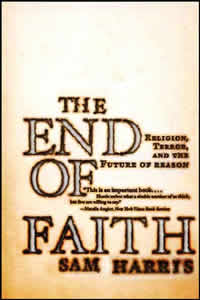Book Notes
 Sam Harris, The End of Faith; Religion, Terror, and the Future of Reason (New York: W.W. Norton, 2004, 2005), 348pp.
Sam Harris, The End of Faith; Religion, Terror, and the Future of Reason (New York: W.W. Norton, 2004, 2005), 348pp.
"My goal in writing this book," writes Sam Harris in his Epilogue, "has been to help close the door to a certain style of irrationality. While religious faith is the one species of human ignorance that will not even admit of the possibility of correction, it is still sheltered from criticism in every corner of our culture." Judging from the book's commercial success, many readers are interested in his demolition derby; the book has enjoyed a long ride atop the NY Times best seller list, it won the 2005 PEN/Martha Albrand Award for First Nonfiction, his much shorter sequel Letter to a Christian Nation now sits at #6 on the list, and its near cousin The God Delusion by the Oxford atheist Richard Dawkins ranks #8.
Harris tries to make the case that society has been far too tolerant of religion, which he considers a form of mental illness and "the most prolific source of violence in our history." For the most part he treats all religions with equal disdain, although separate chapters focus on Christianity (the Inquisition, witch-burning, the Holocaust) and Islam.
If you paid attention in high school you probably encountered his two central points, that religion is (1) intellectually irrational and (2) morally barbaric. One of the most irritating features of Harris's book is his unctuous and overly earnest tone that suggests that he is the first person, either friend or foe, to grapple with these two important problems. He has also set the bar far too high to succeed. In practice, he believes that religion never submits itself to rational discourse and evidentiary claims, which is false. Worse, he argues that in principle "every religion preaches the truth of propositions for which no evidence is even conceivable," which is ridiculous. In his last chapter, though, where he tries to establish a spirituality of consciousness, he appears to give himself a free pass, admitting that many of these important spiritual matters are genuinely mysterious, open to scientific inquiry, and not absent of empirical data like the genuine experiences of mystics.
Harris never argues for atheism, and he argues against Richard Rorty's pragmatic relativism, although he tries to rebut the harsh criticisms of atheists who think that in his last chapter he concedes far too much to "spirituality." The book never engages any of the important discussions about atheism (cf. McGrath), about warrant for belief (Plantinga, Swineburn), about scientists who believe (Polkinghorne, Collins, Gingerich, et al.), or about specifically religious believers who share his concerns about fringe fundamentalisms that do, in fact, foment violence and peddle hocus-pocus (Kimball). At times his argument wanders far off track, as when he appeals to the My Lai massacre, the legalization of marijuana, and the conservative views of Justice Scalia. The book is littered with sweeping generalizations, gross exaggerations, appeals to extremist examples, and specious reasoning (as when he tries to construe the atheism of Stalin and Mao as a "political religion").
But I was glad to read Harris. I appreciated the reminders of how a person outside of any faith community views the fringe and violent elements of religion (cf. the movie Jesus Camp). Many of his complaints are spot on—we should object to uncritical support for Israel, extremists like judge Roy Moore, and the divisive diatribes of Jerry Falwell and Tim LaHaye. There are some things that civil societies should not tolerate. But when he hopes for the complete obsolescence of religion, I kept thinking about my students at Moscow State University and what they told me about the social consequences of the Soviet years that did just that.


